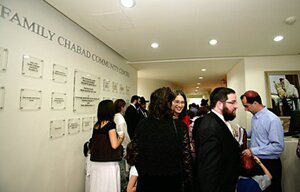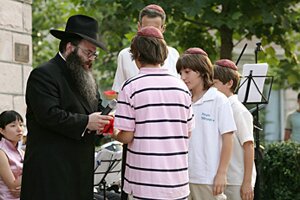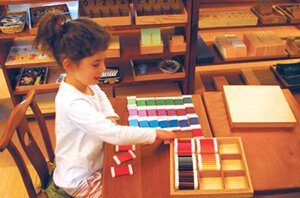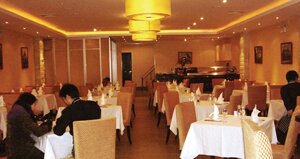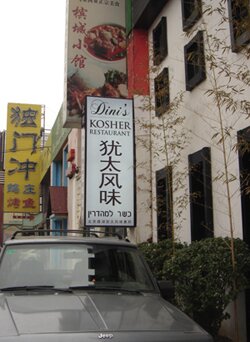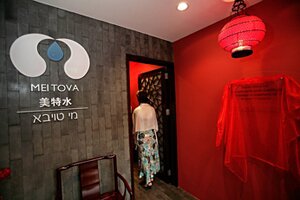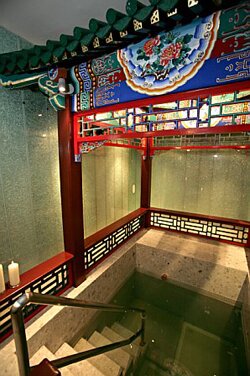Warning: Parameter 1 to plgContentLoginToRead::onAfterDisplayTitle() expected to be a reference, value given in /home/joomla789/domains/jewishtimesasia.org/public_html/libraries/joomla/event/event.php on line 67
| Beijing, China Communities |

|

|
|
Beijing is the capital of the People's Republic of China (PRC) and is one of the Four Great Ancient Capitals of China. It is the political and cultural center of China and is China's third largest city in terms of population.
It is a major transportation hub, with dozens of railways, roads and expressways passing through the city. It is also the focal point of many international flights to China. Although today the city has become a very modern one, it remains spiritually and politically the heart of the country. This bustling city, constantly in the throws of transition as the ancient world meets the modern, is about to get busier and evolve with the world watching. In 2008, they will play host to the Summer Olympic Games.
While Judaism is not one of the five officially recognised religions in China, the community maintains a good relationship with officials from the People’s Republic of China. With respect to the practice of Judaism, conversions are not permitted to take place in Mainland China. The government likewise requires that local Chinese be excluded from the community’s events. They require that visitors be able to show foreign passports as a precondition for participation in events and services. There is an exception for local Chinese who are married to Jews. The Jewish community is extremely respectful of their hosts’ rules and the community is a respected part of China’s expat population. Beijing is also host to an extremely active Israeli embassy that continuously serves to help promote and foster the friendly relationship that the two nations have shared since the formal establishment of diplomatic relations in 1992. There is the opportunity for constant exchange in the arenas of art and culture, academia, agriculture and science and technology between Beijing and Jerusalem. KEHILLAT BEIJING Their first Passover Seder was organised in 1980 and they met mainly in member’s homes, focusing on observing Pesach and the High Holidays. Kehillat Beijing is not officially connected to a particular movement in Judaism, though they receive support and guidance from the World Union of Progressive Judaism and they have selected the American Reconstructionist prayer book for use in their services. They pray in unison in community led services and are completely egalitarian.
The community, while modest, has a Torah that was generously donated and they meet weekly, on Friday nights, for Shabbat services held at the auditorium of the Capital Club Athletic Center. The Friday night services are followed by a Shabbat meal at the Capital Club. They also run the affiliated Ahavat Yitzhak Religious School. The school is dedicated to providing a Jewish education and experience for children ages 4 through post-Bar and Bat Mitzvah. The school encourages the involvement of the students’ families, making this a true community effort. Students learn Hebrew and about the holidays, while focusing on fostering a love for the State of Israel. The school meets every Sunday during the school term and also coordinates youth activities, programmes for the Jewish holidays and community social gatherings While Kehillat Beijing continued to serve the needs of their community of 200 plus members, Beijing began to explode with new opportunities around them. The opening of Beijing to international trade and investment has attracted increasing numbers of Jews from throughout the world. CHABAD BEIJING Rabbi Shimon and Dini Freundlich together with their two daughters, Chaya Mushka and Devorah Freundlich, were selected to establish and run Chabad’s office in Beijing, China. Like the community and Beijing itself, their family has grown as well as they are now joined by their youngest daughter, Chava and their son, Aaron. Residents of Bejing and visitors alike all point to Rabbi Freundlich’s warmth, inclusiveness and extremely gregarious nature as a major impetus behind Chabad’s rapid expansion in Beijing. Chabad Lubavitch of Beijing provides religious services and educational and social activities for not only the growing numbers of Jewish people who live in Beijing but for the large numbers of tourists and businessmen drawn to Beijing.
The Chabad community of Beijing currently has 800 members, living and working in the city, from different countries including the United States, Israel, Azerbaijan/Russia and Europe. In addition to the Jews who live in Beijing, there are approximately 2000-3000 business people and tourists who travel through each year. Included in this group, are the masses of Israeli backpackers traveling through Asia, especially throughout the spring/summer months. Chabad is aiming to help to recharge and reconnect these younger travelers with their Jewish identity. They focus on education and Jewish enrichment with classes and lessons for both children and adults. There are Bar and Bat Mitzvah lessons, One-on-One Classes with the Rabbi, weekly Parsha studies, led by Rabbi Freundlich, and monthly women’s Rosh Chodesh groups. Additionally there are counseling services available. Shabbat services, meals and related activities take place in the Chabad House which has grown from the Freundlich’s early days of hosting both meals and services in their own apartment. In addition to Chabad House, there is the new 10,000 sq. ft. Rohr Family Chabad Community Centre. The Centre has quickly become the heart of the Beijing Jewish Community. It includes: Ganeinu International School for children ages 1.5-12 years, the Chabad offices, a kashrut Office, kosher store, mikveh, and catering and banquet facilities for tour groups. The staff includes not only Rabbi Freundlich and Dini Freundlich but also Rabbi Nosson Rodin, Mrs. Miriam Rodin, and Rabbi Mendy Raskin and Mrs. Chani Raskin. Rabbi Mendy and Chani Raskin are the schluchim of Chabad of Ya Bao Lu, or downtown as it is perhaps better known and has recently moved to a new permanent location in Bejing’s Dong Cheng District. Chabad Ya Bao Lu is also located close to the downtown hotels and hosts Shabbat services and meals every week for overseas guests that are staying in area hotels. Ganeinu is the only Jewish day school in northern China and is a school for the entire Jewish community, regardless of background or affiliation. They utilise a Montessori based curriculum combined with Jewish traditions and cater to the educational needs of students.
The community is proud of their new mikveh which was established with thanks to the Lefkowitz and Godinger families. It includes a mikveh spa for woman, named, Mei Tova. This is a 5 star facility that has successfully fused together Judaic observance with a Chinese traditional theme with a modern touch. The greater Jewish community of Beijing also recently warmly welcomed “Dini’s Kosher Restaurant†onto the Beijing scene. Is is located on a popular bar street and is Beijing’s first genuine Kosher restaurant. The restaurant has been named “Dini’s†in honour of Chabad Beijing’s own Dini Freundlich. This meat facility is operated under the kosher supervision of Rabbi Shimon Freundlich - Director Chabad Beijing. The Israel-China Friendship Society was established in 1992 to strengthen the bond of friendship between the Jewish community and the Chinese people. Also, for the benefit of all members of Beijing’s Jewish community, a Beijing Hadassah International Chapter was founded in recent years, adding to already rich Jewish life available in the capital of China.Beijing is also soon to play host to the International Anne Frank exhibit after it completes its China debut in Hong Kong. Where Beijing may lack in the Jewish history that other municipalities in China can boast, it is clear that this rapidly growing and expanding Jewish community is going to play an important role in the future of the Jews in China.  Location Details: Rohr Family Chabad Community Centre Tel: (86) 10 8470 823   Fax: (86) 10 8470 8221 Email: This e-mail address is being protected from spambots. You need JavaScript enabled to view it  www.chabadbeijing.com Chabad: Kings Garden Villa, Chabad of Ya Bao Lu Kehillat Beijing  (Issue December 2007/Janauray 2008)    |















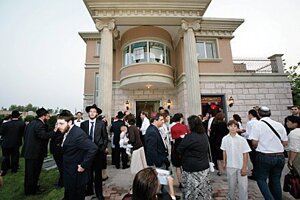 Â
 